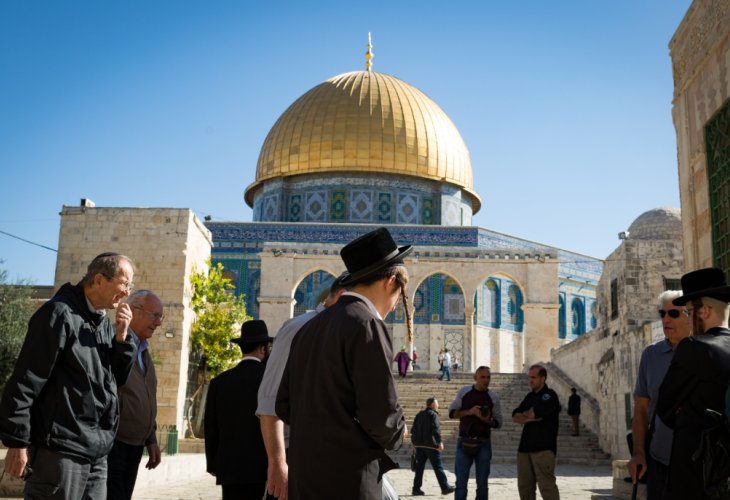Who's Really in Control of the Temple Mount?
Even though Israel captured the Temple Mount during the Six-Day War, the area remains a point of tension. Jews are not allowed to enter the sacred site, and Israel still hesitates to assert full control.
 The Temple Mount (photo: Flash 90)
The Temple Mount (photo: Flash 90)Following the violent attack at the Temple Mount, the Israeli government ordered the closing of the Temple Mount complex. Such an event, where the Mount is closed to Muslims, hadn't happened since Israel captured the Old City. This decision spurred outrage and harsh reactions from the Arab and Muslim world, as any change to the status quo on the Temple Mount could lead to severe responses, earning the region its nickname as the "Powder Keg of the Middle East."
The newspaper 'Yated Ne'eman' published a special overview today (Tuesday) about the history of the Temple Mount, the holiest site for Judaism. It turns out that despite Israel capturing the Temple Mount during the Six-Day War, it still fears taking control, perhaps rightfully so.
There's no need to elaborate on the importance of the Mount for Jews, as it's the place from which the Shechina has never departed, and its sanctity continues to this day. Therefore, it is clear why leading Jewish authorities strictly forbid ascending the Mount.
Unlike Judaism, the area is also a symbol for Christianity and Islam, and therefore, any sovereignty or special control attempted by Israel over the site must be done with utmost caution and sensitivity. During the Six-Day War, after the declaration that "The Temple Mount is in our hands," a soldier from the group that captured the Mount raised an Israeli flag on the Dome of the Rock. This act caused significant shock among millions of believers and Muslims worldwide, quickly spreading like wildfire even fifty years ago.
Defense Minister at the time, Moshe Dayan, ordered the flag to be lowered immediately during the war, to avoid unnecessary riots. Additionally, he decreed that before any formal government decision on the status of the Mount, the battalion guarding inside should exit the Temple Mount complex.
The possibility of an Arab state flag being raised on the Temple Mount also faced strong Israeli resistance. During the Camp David talks in 1978, then U.S. President Jimmy Carter suggested raising a foreign flag on the Temple Mount. Prime Minister Menachem Begin gave a forceful speech expressing his staunch opposition. "Thousands of years of Jewish history in Jerusalem are at the core of our refusal to raise an Arab flag on the Temple Mount. I'm nauseated by the attempts of a mighty superpower to convince us to hoist a foreign flag in Jerusalem," Begin said.
Oddly enough, Ehud Barak, the Prime Minister who offered Palestinians more than anyone, proposed in 2000 to raise an Arab flag on the Temple Mount and grant partial control over the Mount. This time, the Palestinians refused his offer, demanding everything without concession.
Aside from the flag issue, which has sparked turmoil over the years, the main dispute that continues for over fifty years is about the arrangements and security measures on the Mount.
Despite the Hashemite Kingdom being defeated in the Six-Day War, it was Jordan that received a significant and legal standing concerning the Temple Mount. The original status quo established that internal control would remain with the Muslim Waqf on site, which was essentially a branch of the Jordanian Ministry of Awqaf. Even after Jordan lost its control in the Old City, through the Waqf, it continued to exercise control and manage the Temple Mount, including various renovations and upgrades over the years.
Even though Israel wants to maintain the status quo, it is mainly the Palestinians who have breached it over the years. Under the auspices of the northern branch of the Islamic Movement, prayer halls have been opened and expanded, and excavations have been conducted to obscure the Jewish connection to the site, bolstering the Palestinian narrative that the site belongs solely to them.
To avoid provoking riots, Israel has refrained from entering the complex to physically stop these changes. Now, following the severe attack, the first ever inside the Mount itself, the state announced the closure of the site for a few days. After appeals from the Jordanian king, who, as mentioned, is the sovereign in the area, and other leaders, the Prime Minister ordered the reopening of the site and the installation of metal detectors at the entrance.
As expected, Palestinians are angry about this decision, and many have avoided entering the Mount, choosing to hold their prayers outside the protected and controlled entrances.
What will happen next? Will Israel once again yield to the rage of the crowd threatening revolt and remove the barriers from the entrance, or will security considerations lead to a different, deliberate decision? Time will tell. For devout Jews, it is clear the Mount will remain closed, if only to prevent more Jews from violating the grave prohibition of entering the holiest place in Judaism, for as long as foxes wander on the Mount - we must refrain from entering it until we are purified with the Red Heifer's ashes, speedily in our days, amen.

